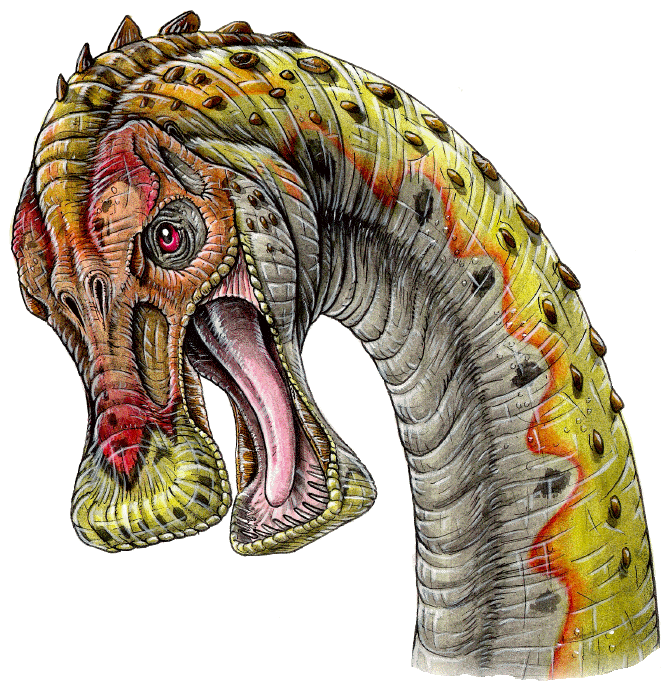|
|
|
Bonitasaura salgadoi
(Sebastian Apesteguia, 2004) |
|
 |
|
Name Means: |
"Bonita Reptile" |
Length: |
30 feet (9 meters) |
|
Pronounced: |
BE-ni-TE -SAWR-us |
Weight: |
40,000 lbs (18 met. tons) |
|
When it lived: |
Late Cretateous - 65 MYA |
|
|
|
Where found: |
Patagonia, Argentina |
|
|
|
This fascinating dinosaur was
discovered in 2004. It has been classified as a titanosaur, a
sauropod, closely related to the Apatosaurus (formerly known as
the Brotontosaurus). This group of animals had always shown
little diversity in the head, especially in the mouth design. Bonitasaura salgadoi
has changed that. It has an unusual, rectangular jaw filled
with
two types of teeth. There is a set
of sharp pointed teeth in the front of its mouth that were
continuously replaced. They are immediately followed by a
continuous wedge-shaped set that filled the middle and rear part of
its mouth. These unusual shaped teeth were used
to "guillotine" hard plant material.
The specimen is a
juvenile known from bones from most of the major parts of the body.
A mature specimen may have been much larger. It's interesting
jaw throw an interesting wrench in
the recent interpretations of
Antarctosaurus as a chimera made up of saltasaurid postcranial
material and a
rebbachisaurid jaw (rebbachisaurids are also known to have jaws
with strongly squared-off front margins):
It was discovered by paleontologists of the Argentine Museum of
Natural Sciences. They knew that Walter Schiller and Santiago
Roth had found some wonderful fossils in the remote Patagonia
wilderness in 1922, but the exact location had been lost for many
years. In searching for clues, they located a woman, named Doña Tika.
Known as the "Tika Woman," she was 98 years old and blind, but as a
young woman she had assisted the Schiller-Roth expedition of 1922.
She was able to lead them to the site. The dinosaur was named
after the Bonita Mountains, where it was found. |
|
|
| |
|
|
|
|
|
|
|
|
Edugraphics.Net | Feenixx Publishing |
|
|
|
|
|